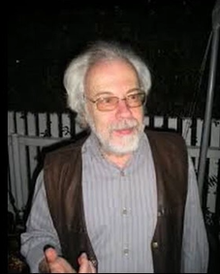Hermann Amborn
Hermann Amborn | |
|---|---|
 | |
| Born | April 11th, 1933 Braubach, Germany. |
| Academic background | |
| Alma mater | Munich Institute of Ethnology |
| Thesis | The Importance of the cultures of the Nile Valley for iron production in sub-Saharan Africa (Die Bedeutung der Kulturen des Niltals für die Eisenproduktion im subsaharischen Afrika) (1973) |
| Doctoral advisor | Hermann Baumann and Helmut Straube |
| Academic work | |
| Institutions | Ludwig-Maximilians-Universität München |
| Main interests | Anthropology, African society and politics. |
| Website | https://www.ethnologie.uni-muenchen.de/personen/emeriti/amborn/index.html |
Hermann Amborn is a German anthropologist and ethnologist. With a regional focus on northern and eastern Africa, Amborn's research addresses the political organisation of society, the division of labour, agricultural ethnology, and ethics in applied anthropological research.[1][2]
Life and career
[edit]Amborn's father was a pastor who opposed the Nazi regime.[1] As a young man, Amborn initially trained as a technical draftsman and engineer before changing fields.[3] Amborn held visiting professorships in Hamburg and Berlin in addition to Kansas State University. He became a full professor at Ludwig-Maximilians-Universität München in 1987, where he was made professor emeritus on retirement in 1998.[1] From 1991 to 2001, Amborn was the ethics working group spokesperson for the German Anthropological Association (formerly Deutsche Gesellschaft für Völkerkunde, now: Deutsche Gesellschaft für Sozial- und Kulturanthropologie).[2][4]
Amborn has notably contributed to the study and discussion of African communities which self-govern outside of a statist framework through anti-hierarchical structures, without reliance on violent coercion in enforcing their rules and laws, and in line with anarchist principles.[5] Mark Bray describes Amborn's work as "challenging the inevitability of the state as the "natural" outcome of societal evolution"[6]
Selected works
[edit]- Die Bedeutung der Kulturen des Niltals für die Eisenproduktion im subsaharischen Afrika. (Dissertation) Studien zur Kulturkunde. Frobenius-Institut, Frankfurt 1976, ISBN 3515024115
- Differenzierung und Integration. Vergleichende Untersuchungen zu Spezialisten und Handwerkern in südäthiopischen Agrargesellschaften. (Habilitationsschrift) Trickster, München 1990
- Unbequeme Ethik. Überlegungen zu einer verantwortlichen Ethnologie. Reimer, Berlin 1993, ISBN 3496025239
- Flexibel aus Tradition / Burji in Äthiopien und Kenia: Unter Verwendung der Aufzeichnungen von Helmut Straube / With explanation of some cultural items in English. Harrassowitz, Wiesbaden 2009, ISBN 3447060832
- Das Recht als Hort der Anarchie. Gesellschaften ohne Herrschaft und Staat. Matthes & Seitz, Berlin 2016, ISBN 978-3-95757-240-0. Materialien vom Autor dazu online
- 'Concepts in Wood and Stone - Socio-religious Monuments of the Konso of Southern Ethiopia', Zeitschrift für Ethnologi, 2002.
- Burji: Versatile by Tradition in Changing Identifications and Alliances in North-East Africa, Volume 1 edited by Günther Schlee and Elizabeth E. Watson. Berghahn Books, 2009.
- Mobility, Knowledge and Power: Craftsmen in the Borderland in Changing Identifications and Alliances in North-East Africa, Volume 1 edited by Günther Schlee and Elizabeth E. Watson. Berghahn Books, 2009.
- Law as Refuge of Anarchy: Societies without Hegemony or State. Untimely Meditations, MIT Press, Cambridge, MA, 2019.[7]
Notes
[edit]- ^ a b c "Interview Hermann Amborn". www.germananthropology.com.
- ^ a b Amborn, Hermann (July 4, 2008). "Interview Hermann Amborn" (PDF) (pdf). Interviewed by de:Dieter Haller [in German]. "Interviews with German Anthropologists". Archived (PDF) from the original on November 8, 2011.
- ^ www.webdecker.de, webdecker-. "Hermann Amborn". Verlag Matthes & Seitz Berlin.
- ^ Vermeulen, Han F. (July 13, 2018). "German Ethnological Society Changes Its Name During a Highly Contested Vote". Anthropology Today. 34 (1): 19–20. doi:10.1111/1467-8322.12407 – via Wiley Online Library.
- ^ Law as Refuge of Anarchy: Societies without Hegemony or State. Untimely Meditations, MIT Press, Cambridge, MA, 2019.
- ^ "Law as Refuge of Anarchy | the MIT Press".
- ^ Press, The MIT. "Hermann Amborn". mitpress.mit.edu.
